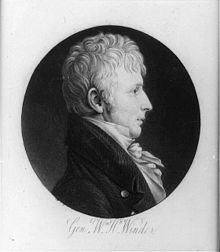William H. Winder

William Henry Winder (1775 – 1824) was an American soldier and a Maryland lawyer. He was a controversial general in the U.S. Army during the War of 1812.
Early life
Winder was born in Somerset County, Maryland. He was the nephew of Levin Winder. He graduated at the University of Pennsylvania, and from 1798 to 1812 practiced law in Baltimore.[1]
War of 1812
Winder was commissioned as a colonel in the U.S. Army at the start of the War of 1812. Promoted to brigadier general, he was one of two acting commanders of the American army at the Battle of Stoney Creek in July 1813, where he was captured, along with fellow commander John Chandler.
Battle of Bladensberg
Exchanged the following year, Winder was appointed commander of the defenses of Washington and Baltimore by President James Madison on July 4, 1814. He received little logistical support from the government, especially Secretary of War Armstrong who received much blame for the upcoming disaster. In August, General Robert Ross with several thousand troops advanced upon Washington. Winder had only a few hundred regulars, and a mob of some thousands of militia to oppose them. He made no attempt to skirmish or slow down the advancing British and decided on an all-or-nothing set piece defensive battle at Bladensburg. The Americans met the British at the Battle of Bladensburg on August 24, 1814. He failed to show effective command in the battle, although he received virtually no support from the Secretary of War and Secretary of State James Monroe actually interfered with his command by repositioning some of the militia, which may have had a significant contribution to the ensuing rout. He clearly did not support Commodore Barney's second line that actually repulsed the 85th foot after the rout of the American first line. As a result of the battle, the capital fell into the hands of the invaders. Winder was afterward court-martialed, but was acquitted of all blame.[1]
After the debacle of Bladenburg, Winder was maneuvered out of having any significant command at Baltimore in favor of the highly competent Samuel Smith and was relegated under protest to the command of limited troops on the Western Approaches to Baltimore which were not considered a likely route for the British Attack. Winder would have participated in the battle at Hampstead Hill to the East of Baltimore had the British decided to carry forward to the attack.
Later life
Winder also testified at the impeachment trial of Associate Supreme Court Justice Samuel Chase.
One of his sons, John H. Winder, was a brigadier general in the Confederate army during the American Civil War.
References
- This article incorporates text from a publication now in the public domain: Gilman, D. C.; Peck, H. T.; Colby, F. M., eds. (1905). New International Encyclopedia (1st ed.). New York: Dodd, Mead.
{{cite encyclopedia}}: Missing or empty|title=(help) - The Dawn's Early Light, Walter Lord
Notes
- American lawyers
- Adjutant Generals of the United States Army
- Inspectors General of the United States Army
- People from Baltimore, Maryland
- University of Pennsylvania alumni
- United States Army generals
- American people of the War of 1812
- 1775 births
- 1824 deaths
- American military personnel of the War of 1812
- American prisoners of war
- War of 1812 prisoners of war held by the United Kingdom
